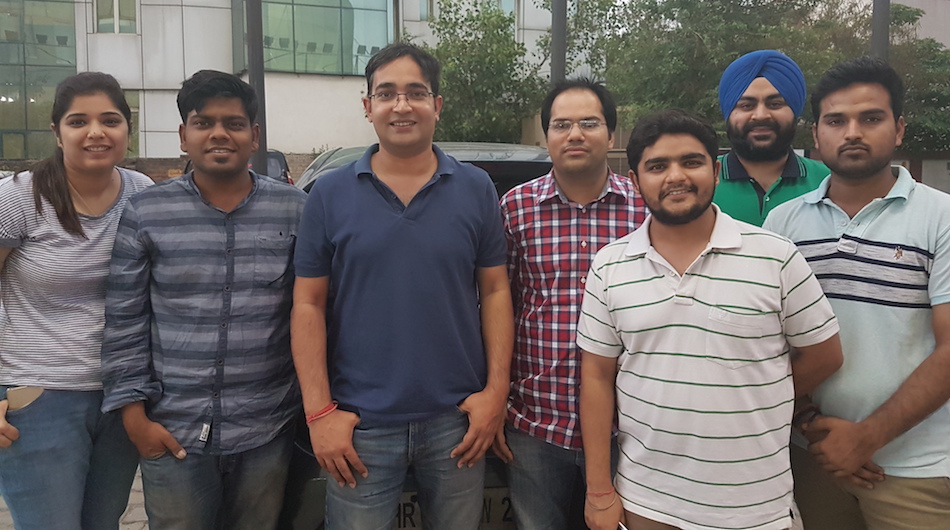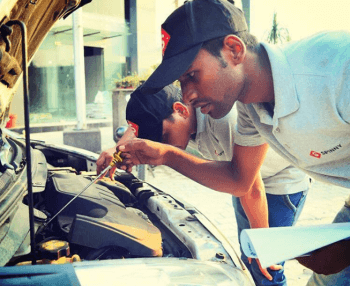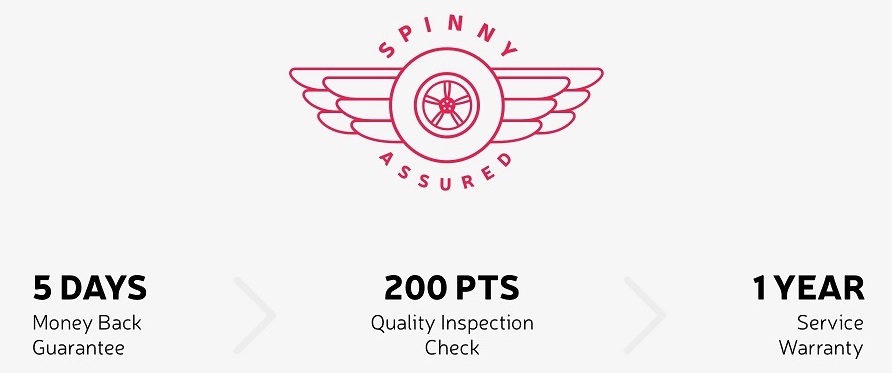
The Spinny core team. Photo credit: Spinny.
The used cars market in India is pegged at around US$125 billion. That could be a conservative estimate given the huge number of fresh car sales clocked in the country: 2.1 million new cars were sold in the last financial year alone (between April 2016 and March 2017). Little wonder, therefore, that there are some big fish swimming in the pool.
CarTrade, for one. Last year, the online auto classifieds company raised US$145 million in funding from Singapore-based Temasek and global investment firm March Capital. It had acquired rival CarWale from German firm Axel Springer for around US$100 million in 2015. Then there is CarDekho, which has raised investment of around US$90 million so far from investors, including Google Capital, Sequoia Capital, Hillhouse Capital, and Tybourne Capital. Another startup, Droom, bagged around US$43 million to expand out of its home turf to Southeast Asia. Swimming with these is young Spinny, which today announced its seed round of funding – about US$1 million.
We wanted to be 200 percent sure that our business is addressing the right pain-point.
You might be tempted to call it audacious, but Spinny has learnt from the mistakes of its well-funded rivals, course-corrected, and fixed its business model before gunning for scale. That’s why Blume Ventures, Indian Angel Network, and FreeCharge founders Kunal Shah and Sandeep Tandon are betting on this startup in Gurgaon near Delhi.
The startup’s founders are seasoned players: Niraj Singh, a founding partner with Outbox Ventures; former Flipkart executives Ganesh Pawar and Mohit Gupta; and ex-Adobe man Ramanshu Mahaur. It began operations in June 2015 but took its time to raise its first round of external capital. Why?
“We wanted to be 200 percent sure that our business is addressing the right pain-point. And that it is creating value for the customer, is sustainable, and has a way to scale. So we focused on the business model and the product till now. Now that we are confident of having achieved those, we have decided to focus on the scale,” co-founder and CEO Niraj Singh tells me.
The matter of trust

Photo credit: Spinny.
If there’s one issue that’s been plaguing the used cars space in India – both offline and online – it’s the lack of trust. Unlike in more developed markets, there is hardly any credible paper trail on the quality of the vehicle or its usage in India, so a potential buyer is skeptical twice over.
Used car salesmen are notorious for pulling fast ones on buyers and so, there is a need to look under the hood for defects. Last month, CarTrade acquired Adroit Inspection for its 300 field inspectors spread across the country and its tie-ups with banks and insurance firms to tackle mistrust.
See: A leading used car marketplace tackles the problem of trust with an acquisition
Spinny want to keep the inspection in-house and has a team of experts who will inspect a car twice on about 200 factors before onboarding it to its platform. “If the car does not meet our quality checks, we will just connect the seller to our partner dealers and help him sell it through them. We won’t onboard it on Spinny for buyers,” Singh says.
He explains that while buying a used car, there are two major concerns:
* Is there a defect that is being hidden from me?
* Is the deal priced right for me?
Spinny’s claim is that defects won’t be hidden and the price will be fair. “As a testimony to this, we offer a 5-day money-back guarantee to our buyers. This is like the no-questions-asked returns policy of Amazon. If you have any doubts about a car’s quality after you have bought it from Spinny, or spot any defects which were not mentioned earlier, or you think you paid more than what you think is a fair deal, you can return the car to us within five days and we will give you a full refund,” Singh says.
You can’t have an accident or modify the car in any way before returning it – obviously.
A timely pivot
Peer-to-peer used cars marketplace GoZoomo was one of the first startups to take on the problem of mistrust head on. It sent expert technicians to look under the hood for the buyer and connected the buyer and seller directly to close the deal. It raised a series A funding round of US$7 million from Saif Partners and Yuri Milner, on top of a US$600,000 seed round. But despite several iterations in the business model, the unit economics did not add up, and GoZoomo shut shop.
See: Millions in the bank, GoZoomo shuts shop, returns VC money. The whole story.
Spinny too had a model similar to GoZoomo for a year. They too would inspect a car first, see if it passes quality checks, then onboard it, find a buyer, connect the buyer and seller, and finally help them close the deal. “But the entire transaction used to get stuck in the coordination between the seller and the buyer. If the buyer is available, the seller might not be, and vice versa,” Singh recalls.
Spinny ran with it for a year and eventually realized that they needed better control over the inventory.
“A car buyer is very experience-sensitive. If the seller does not cooperate, then the buyer don’t want to close the deal. He might be buying a used car, but he expects the same kind of experience offered while buying a new car,” Singh explains. So in September last year, Spinny pivoted.
Full-stack, inventory-holding model

Unlike others in the space, Spinny took a full-stack approach. If you have a car to sell and you reach Spinny online with all the basic details of the vehicle, the company will offer you a price range. Its tech muscle comes to play here, along with the experience of its team of car inspectors.
Spinny’s first offer is to just give you a fair idea on what is going to be the selling price of your car. If you are comfortable with that price range, you can give Spinny your contact details to schedule a physical inspection of the car. If the car passes all of Spinny’s quality checks, it will offer a final price – “that will be very close to the initial price we offered,” says Singh. If you accept the price, Spinny will release the payment right away, complete the paperwork, and take custody of the car.
The car will then be taken to one of Spinny’s hubs for washing, waxing, and servicing. Then it will be onboarded with all the details of the vehicle, including its condition when Spinny first inspected it. The whole process takes three days on average, Singh says.
The idea is to make the used car buying experience just like the experience of buying a new car.
“The buyers should be able to do the discovery online, have enough details to make up their mind tentatively, and then find out which hub the car is parked at to schedule a visit. Our sales guy will meet them there, and if all is well, they can close the deal then and there,” Singh adds.
The average inventory-holding time is around 24 days for Spinny. “This includes everything – from the day I release the payment to a seller till the day I get the payment from a buyer,” Singh says.
Holding inventory in a high-ticket space like used cars means a lot of capital. But Spinny has done it so far with minimal external capital infusion. How? That’s part of the secret sauce that Singh doesn’t want to go public with, yet.
But he is ebullient about Spinny’s attempts to delight its customers. It offers free car servicing to the buyers just like a new car dealer would. Last week, it also started giving a full tank of fuel. “In the first month, the buyer should not even need to go to the fuel station, leave alone the workshop. The idea is to make the used car buying experience just like the experience of buying a new car.”
Spinny refuses to waste time on bargaining and so, there is hardly any room for price negotiations – neither from the seller nor the buyer.
The startup has about 200 cars onboard for sale currently. It operates only in Delhi and the surrounding National Capital Region (NCR). This region accounts for 18 percent of the Indian used car market, points out Singh. According to him, Spinny has sold close to 250 cars since the pivot in September.
A car is a high-value purchase and it is next to impossible to find repeat buyers. So won’t that pump up the customer acquisition cost? “Referrals are high,” says Singh. “One-third of our current business is coming through referrals from old customers – that is compensating for the non-repeat nature of the purchase.”
If a customer has an unhappy experience, a single one of them can cut down some 10 percent of your business, he explains. That’s why Spinny has its eyes trained on the customer experience.
This post Mistakes of its well-funded rivals taught this startup to pivot and steal a march appeared first on Tech in Asia.
from Tech in Asia https://www.techinasia.com/mistakes-funded-rivals-taught-spinny-to-pivot
via IFTTT
No comments:
Post a Comment